Phineas T. McGregor: the Great Bank Robber
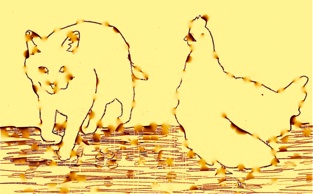
Phineas’s life had been a good one...at least it, for the most part, was satisfactory to Phineas. He was reared by Maud and Thadeus, and they had always been generous and kind to him. They, first Maud and then Thadeus, passed away while Phineas was an ag student at A&M. Maud died in the spring, and Thadeus followed her in the winter. At Thadeus’s funeral, the owner of the local pottery, “Old Tom,” offered Phineas a job at his pottery, Mills Pottery which had been in business since 1889. Phineas liked A&M well enough, but he had longed to be home in Barton, and, besides, the chickens needed feeding and the cows needed to be looked after. “Why not,” he thought. His early jobs there required great physical stamina of which the young Phineas had plenty. Through the years, Phineas steadily advanced to team supervisor and even did some design work of which he was particularly proud. Advancing beyond team leader was out of the question because “Old Tom” had three sons who worked with him. So Phineas spent forty satisfying years there. Over the years, the pottery had employed fewer and fewer of Barton’s residents until it evaporated five years after Phineas had retired.
Along the way he married a local girl, Ellen, and they reared two children together. The children had grown up and moved away from the farm: the girl had married an ambitious boy, and they had moved to California; his son, Thad, had graduated from A&M as a civil engineer and was presently surveying the plains of Wyoming. Mary and Thad didn’t get back to Barton very often, sometimes at Christmas, but Phineas knew his children were doing well and neither had broken any laws as far as he knew. He was willing to settle for those thoughts.
Phineas and Ellen had a quiet, solid relationship in which they knew they could depend on each other’s love.
Ellen passed away a few years ago, quietly, silently in the night. Phineas discovered she was gone after making his morning coffee and sitting on the porch with Jack waiting for the sunrise.
Phineas, of course, missed Ellen mightily and often visited her at the cemetery on the church grounds where he was a deacon, and he assumed he would rejoin her in Heaven shortly. After all, he was seventy-five when Ellen passed.
Years passed but Phineas didn’t seem to be making the inevitable march to the Great Beyond as speedily as he had assumed...unlike his father who allowed only two seasons to pass. It began to occur to Phineas, although eighty-two, he might live, perhaps, another decade. The thought made him restless.
Phineas kept himself busy on the farm mending fences and feeding cows which had become more like pets than sources of income although he did occasionally haul one to auction. With each passing year, he became more and more reluctant to part with his cows. I guess he had become a “gentleman” farmer, although Phineas would never admit to that title.
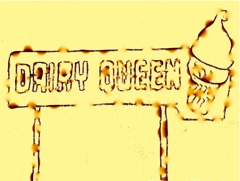
Most weekdays, Phineas would drive into Chandler to the Dairy Queen each afternoon in the heat of the day to get a cup of coffee and a little human contact. Mostly his human contact was Bill. Bill and Phineas had gone through grade school and high school together. They had played together on the same teams in high school, and Bill, a lifelong bachelor, was Phineas’ best man when he and Ellen married at their church. As they sat together in the DQ, they sometimes felt like the last leaves on the tree even though most of the afternoon customers shared various shades of white hair.
“How ya doin’ Bill?’
“Fine, Phinny. You?”
“Okaydoke, Bill.”
Sometimes that was just about the extent of their conversation with the exception of their parting words.
“See ya, Phinny.”
“See ya, Bill.”
Part of the DQ ritual for Phineas and Bill was reminiscent of their childhood together. Bill had been the high scorer on their basketball team largely because of Phineas’s uncanny ability to make passes to Bill without looking at him. The hometown fans loved it when Phineas made one of his unerring passes to Bill while facing away from him. Flip, over his shoulder to Bill, and Bill would make an easy goal. Each day as Phineas rose and walked away from Bill still sitting at their table, Phineas would flip over his shoulder a napkin rolled into a small ball that Phineas had prepared for the moment while he communed with Bill at their table. Bill would always catch the missile and shoot it into the nearby trash receptacle, and sometimes the locals would offer a smattering of applause. If there were strangers in the DQ who had never seen the Phineas and Bill show, they would look at each other wondering what had just happened.
Not much happened in Chandler other than the usual things which regularly occur in small communities throughout Texas: reports of the local football team or basketball team or baseball team were of some interest to both Bill and Phineas, both of whom had played all sports in high school. The Four-H and FFA were very active in the community, and both old men were generous, as generous as they were able to be, when young fellows or gals came around to sell raffle tickets to raise money for their projects. Phineas still had his FFA jacket hanging in his closet. It, of course, didn’t fit anymore, but Phineas enjoyed knowing it was there hanging in his closet.
Occasionally, there would be rumors of someone wandering off the reservation and finding themselves in the wrong bed. Phineas had witnessed plenty of these events and had faith that the miscreants would settle down and everyone would go back to their own beds.
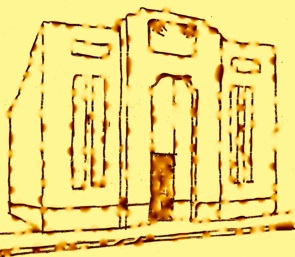
The most exciting event which had happened in the town in recent years was the the great bank robbery a few months prior. The bank, a nice dated 1930’s grey, somber structure, sat across the street from the Dairy Queen. Phineas, as he sat communing with Bill, would usually take note of the comings and goings into and out of the bank. Often the faces were unfamiliar to Phineas. The bank was a place that Phineas decided long ago was much like bus stations, a place that seems to attract a disproportionate number of lost souls. Phineas observed this when he had taken Greyhounds to A&M and back home. Phineas seldom darkened the door of the bank.
One afternoon Phineas and Bill’s quiet cup of coffee was interrupted; the old heads in the DQ turned slowly toward the bank across the street. They had heard a report like a backfire and their old heads and eyes turned toward it. Bill and Phineas sat unmoving trying to understand what they were witnessing.
There were two young fellows coming out of the bank, one carrying a shotgun and the other what appeared to be a potato sack. They seemed to be in a rush to get into the car parked in front of the bank. One was fumbling with his keys trying to unlock the driver’s side of the beat up 70’s Oldsmobile while the other was shouting and gesticulating using the potato sack for emphasis. Once in the car, they left a layer of rubber on the pavement as they made a noisy U-turn which the DQ customers momentarily feared would include the DQ, headed North barely keeping their vehicle in the confines of the street.
A few of the DQ customers moved out to the street to follow with their eyes the careening Olds as it sped away. A few moments later, the bank president cautiously eased his head out of the bank door looking up and down the street. Finally, he slipped out to the sidewalk and began to walk up and down in front of the bank gesticulating wildly, and occasionally a whiff of a curse word would float across the avenue to the DQ. Old Mrs. Wilson slowly sauntered across the street from the DQ to try to console the bank president who was a great nephew of hers. The customers filed back in to finish their coffees or soft drinks or sodas, and within five minutes, the conversations had turned back to civilized domestic matters. A city police car had shown up pretty quickly at the bank, and the local police chief, gun drawn, had charged into the bank. All was quiet now on the street. Slowly the old heads of the DQ began to turn to the North. A siren was rising in volume from that direction. A moment later the bank Oldsmobile whooshed by in a blur followed by a state police car at a similar reckless speed. The DQ residents listened, straining their ears, until all vapors of a sound had disappeared.
Phineas had had enough of town communing for one day and said his usual goodbyes to Bill and headed to his truck. As he cranked the old truck up, Phineas realized that he hadn’t flipped the napkin over his shoulder to Bill. “Oh, well. There will be other days,” he thought.
Phineas had never told anyone, but since the great bank robbery of six months earlier, he had dreamed of robbing the bank himself. It wasn’t that he needed the money or the title “bank robber”; it was just the sheer unprofessional manner in which it had been robbed. In his dreams he was a much more efficient bank robber and more polite and he didn’t use profanity, and he sure as Hell didn’t lock his escape vehicle. The dream seemed to come to Phineas every couple of weeks. He couldn’t seem to shake it, but he was amused when he awoke as he remembered his great bank robbery.
As he turned off the main highway onto the gravel road home, Phineas thought to himself, “I guess I’ll dream even more often of robbing the First Bank and Trust.” His thoughts quickly turned to Jack who would come off the porch to greet him at his truck. The gravel road to Phineas’s farm was a long, winding one through a heavily treed area which was connected on each end to paved roads which led to other communities which Phineas infrequently visited. There were seldom any cars or trucks stirring up dust on the road.
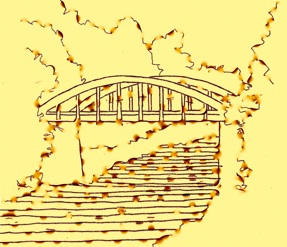
About a quarter mile from his farm, as Phineas rounded the last turn before the Mitford Creek bridge, he was awakened from his daydreams by the sight of a vehicle which had for some unknown reason parked halfway across the bridge. As Phineas pulled his truck up next to the old car, he realized who these folks were.
Phineas leaned toward them and inquired, “Ya’ll got car trouble?”
The driver seemed to be undecided as to how to reply but finally said, “Out of gas.”
“Well, I think I can fix that,” Phineas smiled, opened the truck door, and took a five-gallon gas can from the back of his truck, walking around to the side of the Oldmobile. He unscrewed the gas cap and tilted the bottom of the can gently upward. He heard the two fellows loudly whispering to each other, then the passenger emerged and ran to the head of the bridge and off to the side below the bridge. The driver got out, took a long look at Phineas and decided it was safe for him to go around to the railing of the bridge to relieve himself. Phineas took a side step still holding the can and looked into the backseat of the car as the gas gurgled from the five-gallon can; he saw the bankrobber’s potato sack lying on the floor of the backseat. Phineas saw his moment, reached down with one hand, the other still holding the can as it gurgled its last. A quick flip over his shoulder as he had for so many times flipped the basketball to Bill, and the bag plunked into the bed of the pickup. The driver, hearing the plunk, glared over his shoulder suspiciously at Phineas and returned to the driver’s door and yelled for his partner to hurry up. He turned back to Phineas looking undecided. He reached into his front pocket and brought out a five handing it to Phineas saying, “That’s all I got.” Phineas took the five and smiled.
“You got a cell phone, oldtimer?”
Phineas chuckled and said, “No, don’t have one. Sorry.”
The passenger bandit came running down the bridge still zipping his fly. The driver opened his door, glanced at Phineas and said, “Thanks, old timer,” cranked the Oldsmobile and to Phineas’s surprise didn’t leave rubber on the old bridge’s planks.
Phineas was left still holding the empty gas can staring after the Oldsmobile as it disappeared from view around the corner.
Phineas suddenly felt an urge for a cigarette. Phineas never was a great smoker, but he occasionally felt the need for one and kept a half empty pack of Camels in the glove compartment of the old truck. Retriving the pack and a small box of matches, Phineas stood on the side of the bridge looking down into the barely moving water of the creek below occasionally taking a puff of the much needed cigarette.
“Time to get home,” he thought, “Jack will be wanting his evening meal.”
After frying some bacon and making a bacon-lettuce-and-tomato sandwich and pouring a large glass of milk for himself and a little bowl for Jack, Phineas went to the front porch and settled in staring into the sunset waiting for dark to close the day with Jack at his side eating the pieces of bacon Phineas periodically dropped for Jack to quickly gobble down.
After finishing his sandwich and milk, Phineas went to the truck to retrieve the potato sack and returned to his rocking chair on the porch followed every step by Jack.
Phineas sat in his chair and casually opened the bag. Staring into the bag, a little whistle of surprise escaped his lips. Phineas then stared into the darkness wondering at this turn of fortune.
“Jack,” he said leaning downward toward the old cat, “I’m a bank robber.” Jack purred as if in approval.
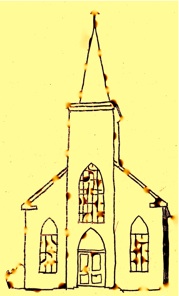
There was quite a stir in Phineas’s church come the next Sunday. Someone had anonymously donated $6,049.00 in a paper bag found behind the minister’s pulpit with a hand scrawled note: “The Lord works in mysterious ways.” It, of course, was unsigned.
A couple of weeks later during one of their afternoon communes, Bill read aloud for Phineas’s benefit an article which appeared in the Tribune, the county newspaper, that the bank robbers had been apprehended, but the stolen loot had not been recovered.
Phineas’s only response was, “Mysterious, Bill, truly mysterious.”
enough





